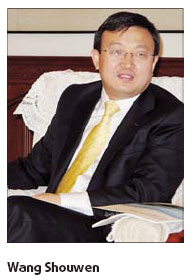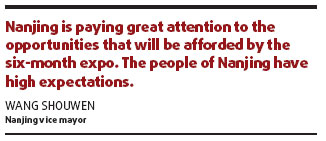If Shanghai is like New York City, then Nanjing, in the eyes of its Vice Mayor Wang Shouwen, is China's Boston, a secondary city with a strong sense of history that has secured a strategic place in Shanghai's city belt.
For years, Nanjing has benefited from the port city's leading role in developing the Yangtze River Delta region. When the 2010 World Expo rolls round next year this relationship should hit the next level.
"Nanjing is paying great attention to the opportunities that will be afforded by the six-month expo. The people of Nanjing have high expectations," Wang told China Daily.

"The Shanghai Expo will no doubt boost the economy of the region and push up employment," he added, referring to the spin-off effects the expo is likely to have on Nanjing's economy.
Economists say expo-related consumption could trigger 10 times as much growth in related sectors, giving Nanjing's GDP a major boost.
As the capital of Jiangsu province (its name literally translates as southern capital), Nanjing holds a prominent place in Chinese history and culture, having served as China's capital during several historic periods. It is now listed as one of the country's Four Great Ancient Capitals.
It is one of the largest commercial centers in eastern China. Recent years have seen substantial investment in the city's economy, commerce, industry and infrastructure.
This investment has seen the city's GDP rise to $7,000 per head of population, whilst its technical competence and resource now puts it in the top 10 of all mainland cities.
Because of its prominent influence and proximity to Shanghai, Nanjing was chosen as the host city of one of the highest-level expo forums, a key activity on par with the exhibitions and performances on offer at the World Expo.
During the six-month gala that will start in May, government and business leaders from home and abroad will gather in Nanjing to participate in in-depth discussions on the theme of Urban Responsibilities and Environmental Changes.
On this topic, Nanjing has many lessons and experiences to share, Wang said.
"The selection of environment as the forum's theme is determined by Nanjing's specific positioning in its urban development," he said.
Nanjing is, on the one hand, a riverside city that combines mountains, rivers, old city relics and a large green belt in the city proper. On the other hand, it is a rapidly industrializing city of 7.8 million people that is running short of land space and natural resources.
But Wang stressed that years of investment have paved the way for the city to confidently approach and deal with any environmental hazards that should crop up.

For example, Nanjing used to be dubbed one of the four furnaces of China due to its heat, a title it has since shaken off thanks to a spate of cool summers in recent years and its remarkable greening rate of 48 percent, double that of New York.
After successfully managing the Qinhuai River, which runs through the city, Nanjing was awarded a Scroll of Honor Special Citation by UN-HABITAT last year.
Since 2002, Nanjing has committed to cleaning up the river, a waterway of enchanting scenery and great cultural heritage but once seriously polluted by factories and squatter settlements from the 1980s.
The local government spent billions of yuan cleaning a 23-km stretch of the river, relocating more than 6,000 squatter families and 159 riverside factories, thereby returning a pleasant living environment to existing neighborhoods.
"Nanjing will discuss specific topics with professionals from other countries and cities at the expo and explore ways to build and protect our planet," Wang said.
Buoyed by its strong sense of cultural heritage, the city is also looking to the fair to build its tourism sector and commercialize its global brand. Expo organizers have already approved two expo-themed tourism routes in Nanjing, featuring relics from the Ming Dynasty (1368-1644) and the Republic of China (1911-1949).
The Shanghai-Nanjing Intercity Railway, which will be completed next July, will make transiting much easier by halving the travel time between the two cities to one hour.
This will be good news for the up to 20 million tourists who are expected to flood Nanjing during the expo. Last year, the city welcomed 50 million tourists.

